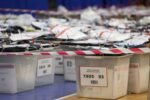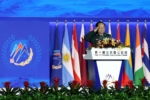The issue of whether Serbia has withdrawn a letter sent to the European Union regarding Kosovo is shrouded in mystery, following contradictory statements from the European bloc and Kosovo authorities, while Serbian leadership has made no specific comments.
On September 6, after a meeting in Pristina with Kosovo’s chief negotiator, Besnik Bislimi, the European envoy for the Kosovo-Serbia dialogue, Miroslav Lajčak, declared that Serbia had withdrawn the letter from then-Prime Minister Ana Brnabić.
Through this letter, sent to Brussels in December 2023, Serbia expressed reservations about the Agreement on the path to normalizing relations with Kosovo and its implementation Annex, which the EU sees as a historic agreement in the process of resolving disputes.
However, after meetings with Lajčak, Bislimi stated on September 17 that he understood the letter had, in fact, not been withdrawn.
“What he meant to say in Pristina is that work is being done with Serbia to withdraw the letter. The letter has not been withdrawn and there has been no request for its withdrawal from Serbia yet,” Bislimi declared.
The EU spokesperson, Peter Stano, said to REL that Brussels does not comment on the statements of either party, adding that Serbia should be asked about its actions.
“We expect the parties to finally focus on the implementation [of the Agreement] and not waste time on diversionary tactics,” Stano said.
Sources from REL in the EU stated that no one in Brussels has declared that the letter has been withdrawn, except Lajčak. Stano had previously stated that he had nothing to add to what Lajčak had said in the Kosovar capital.
Meanwhile, Serbian President Aleksandar Vučić neither denied nor confirmed that his state has withdrawn this letter.
The Importance of the Letter
Toby Vogel from the Council for Democratization Policies in Brussels stated that Brnabić’s letter has always been “somewhat mysterious.”
He noted that even its delivery was unusual, as Brnabić handed it to a mid-level official of the EU’s External Action Service, which he considers a breach of protocol.
“Given that the EU did not announce this letter at the time, it is extremely unusual to now announce its withdrawal,” Vogel assessed.
According to him, such a withdrawal should be announced by the Government of Serbia.
“By announcing this alleged withdrawal, even if it turns out to be true, Lajčak became a spokesperson for the Government of Serbia. If nothing else, this calls into question Lajčak’s political judgment,” Vogel said.
Nikolla Burazer from the Center for Contemporary Politics in Belgrade stated that the EU has made it clear to both parties that they must unconditionally implement the Agreement, from which the European path of both countries depends.
For Serbia, the Agreement is part of Chapter 35 of the negotiating framework for EU membership.
Burazer assessed that the EU “does not take Brnabić’s letter seriously” and the reservations expressed through it by Belgrade.
“Whether [the letter] is withdrawn or not, it does not affect the parties’ obligations in any way. The EU sees [the Agreement] as a commitment that the parties must fulfill if they want to move forward in European integration,” he said.
Kosovo Prime Minister Albin Kurti set three conditions for engagement at the political level of the dialogue a year ago. One of these was the withdrawal of the letter.
Is There Interest in Normalization?
In the letter, Brnabić stated that the Agreement is acceptable to Serbia only in a context that does not refer to the de facto and de jure recognition of Kosovo. It also states that Belgrade does not agree to Kosovo’s membership in the United Nations or in mechanisms and agencies that exist within the UN.
For Vogel, Lajčak’s announcement of the withdrawal of Brnabić’s letter indicates that the West is desperately trying to show that the dialogue is ongoing.
“They desperately want some good news, as evidenced by the alleged withdrawal of Brnabić’s letter, as proof that the dialogue is yielding results, that the Brussels/Ohri agreements are valid, and that the West’s approach favoring Serbia and penalizing Kosovo is working,” he said.
Both Vogel and Burazer agree that Kosovo and Serbia are currently not interested in normalization but want to “buy time” before fulfilling their commitments in the process that began in 2011.
Meanwhile, Lajčak declared that societies in Kosovo and Serbia are not ready for normalization.
Regarding the future of the dialogue, Burazer does not expect changes in format and approach, while Vogel calls for a new model to ensure the process’s success, REL reports.






